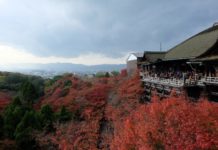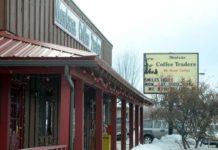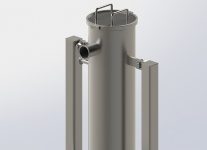Please don’t die, coffee. Photo via Flickr user CIAT
This post originally appeared on VICE Canada.
You probably don’t want to think about a world without coffee. Even if you’re not a three-cups-a-day pour-over fetishist, it’s fairly easy to imagine this scenario could end with Mad Max-style road wars. Just the thought of losing it is enough to spark a hoarding instinct.
Apparently climate change could make this post-apocalyptic, caffeine-free wasteland a reality. A recent Climate Institute study found that a global temperature change by 2 to 5 degrees Celsius will create rainfall patterns and rising temperatures that could knock out half of the area suitable for coffee production by 2050. Wild coffee could be extinct by 2080. The bean could suffer the fate of the banana.
Of course there are also economic consequences. A plant that helped cultivate imperial trade routes could once again change the shape of the world economy. In Canada, over 170,000 jobs relate to coffee, from roaster to barista. In the US it’s over 1.6 million. The National Coffee Association in the US estimates economic impact of coffee to be $225.2 billion. 7.75 million 60 kilo bags were exported globally in July alone.
Since it’s impossible to unknow this extinction possibility, we reached out to some experts to figure out what might happen if coffee disappeared tomorrow.
Augustine Sedgewick, a historian in American Studies at Harvard University who has written extensively on the coffee trade. Mark Pendergrast, author of Beyond Fair Trade and Uncommon Grounds: The history of coffee and how it changed the world. Peter Giuliano, senior director of the Specialty Coffee Association of America.
VICE: What happens if coffee disappears tomorrow?
Augustine Sedgewick: I would buy stock in Monster energy drinks. Something would fill that space. If we can synthesize hamburger at this point I would assume we can synthesize coffee.
Mark Pendergrast: You would have a lot of people having withdrawal symptoms. A lot of people would have headaches and be grumpy. Some people have even been known to throw up. Thankfully it would only last a few days… People might turn to soft drinks, and then they’d be drinking a lot more sugar.
After we get over our raging coffee hangovers, a lot of us would be out of work. What happens to every writer, actor, and student employed at their local coffee shop?
Sedgewick: They start to work at the local coffee-flavoured Red Bull dispenser. But the number of people employed in the coffee industry can vary, from landowners, or those working on plantations. If there are 150 million people reliant for everyday livelihood, probably there will be about 149 million who will be really happy to not have to go to work tomorrow. Because a lot of the jobs that exist in that sector are really tough jobs and that includes producing and serving coffee.
Peter Giuliano: A coffee shop or a small coffee roaster is one of the really positive, and accessible small businesses people can start with not a huge amount of investment. I used to have a coffee roasting company. A lot of our customers were in small towns that had lost their industry, in North Carolina or Virginia. Someone would take their savings and open a coffee shop in the community and it provides a gathering place. It’s part of the signs of a neighbourhood that is thriving is the existence of a coffee shop. And we tend to think of the big businesses, but there are over 2,000 roasters and 4,000 small coffee shops around the US.
North America is only one end of the global trade. What happens on the growing end?
Sedgewick: The problem with putting coffee at the centre of a national development strategy is that coffee is grown in many places around the world in the global tropical belt. The fact of its widespread cultivation very often means that in the coffee sector there is a race to the bottom in terms of price. When you’re talking about plantation cultivation you’re talking about people working on plantations because they have no other way to eat. And so when big cash crops go away or crash in price then you’re talking immediately about hunger and starvation.
On the other hand … despite some economic dislocation, I’m not sure that the economic connections and the livelihoods derived from coffee are more advantageous than disadvantageous. If coffee went away in places where it’s now a dominant cash crop would it be a net loss or a net gain for that society? I don’t think it’s obvious it would be a net loss. There would be costs of that loss, but would there also be benefits I think yes.
But coffee is also the primary way that people think of doing good in the world economy. It was the first fair trade product. The first formal set of fair trade standards were centred on coffee. And coffee is by far the most common fair trade product. Coffee is the centre of those conversations such as they are at the moment. To lose them would be a loss.
Coffee shops are often a sign of a thriving or gentrifying neighbourhood. What happens to our urban social space after coffee?
Sedgewick: It’s an interesting question because what are cities now? They’re basically coffee shops and banks. Starbucks is the public washroom. It’s become public space not just for people who live outdoors, but it’s the place where people go to think in public. There’s surely some emotional attachment that people have to those spaces that prepare this thing that is more or less the same everywhere you go. You have to think that if coffee went away that emotional attachment would take new form.
Giuliano: We’ve lost some of the opportunities to interact with people over time, but the coffee shop is a good location for that interaction. Coffee shops are spaces that different cultures can all go. There are restrictive spaces, a high end mall, or a punk club, but coffee shops include larger groups of people than most and so it becomes the default setting for community. If you go to Ethiopia where coffee was started the community comes together around coffee. We still do it, we share information over coffee. There are similar rituals rules around tea and mate in South America. It’s no coincidence that all have some version of caffeine in them.
I asked an expert in neuroscience who studies the interaction of chemicals on the brain. He said caffeine gets the brain working faster by getting the different parts of the brain to connect more quickly. But another group of chemicals called flavonoids have been shown to reduce social anxiety. So potentially at the same time we’re getting smarter, we’re also more likely to interact with other people. It’s like a one two punch of intelligence.
Could anything replace that function in society? There’s not an obvious one because coffee behaves quite differently. Tea doesn’t have that sense of energy that coffee does.
Like any crop, coffee has an effect on its environment. What happens if it disappears?
Pendergrast: Not much grows where good coffee grows—between 3,000 and 6,000 feet above sea level in semi-tropical areas where the temperature never freezes. They would probably start growing more coca leaf, which grows at about the same altitude as coffee. That may have a negative impact on people and the drug trade.
Giuliano: Almost every answer is ecologically worse than coffee. The easiest one is cattle raising. And cattle raising is terrible on erosion, it requires cutting down the forest, whereas coffee can be grown within indigenous forest.
Follow Samantha Power on Twitter.






















